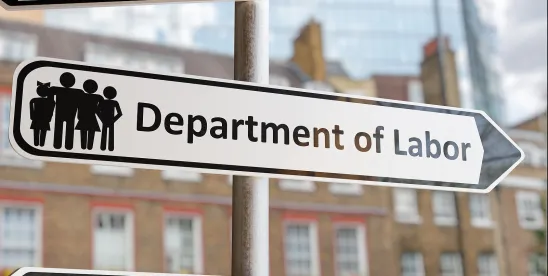On October 15, 2024, the Solicitor of Labor of the U.S. Department of Labor (DOL) published a “Special Enforcement Report” declaring the DOL’s intention to oppose and deter seven contractual provisions that the DOL describes as “coercive.” For those unfamiliar with the position, the Solicitor of Labor (SOL) serves as legal advisor to the DOL and is authorized to sue employers for violations of laws enforced by the DOL.
The contract provisions the SOL is targeting are as follows:
- Provisions requiring workers to waive rights under wage and hour laws
- Misclassification of workers as independent contractors
- Indemnification provisions that shift liability to workers
- “Loser pays” provisions
- “Stay-or-pay” provisions
- Confidentiality, non-disclosure, and non-disparagement provisions
- Requirements that workers report safety concerns to their employer before contacting a government agency
Can you give us more detail regarding these seven contract provisions?
Of course. Here is the crux of the provisions the SOL takes issue with and why:
Contract provisions requiring workers to waive rights under wage and hour laws
According to the DOL report, some employers require workers to sign agreements waiving their right to bring claims or to recover damages for minimum wage and/or overtime violations, or shortening the statute of limitations to bring such claims. The SOL maintains that these rights are not waivable and, therefore, such agreements are invalid because they deprive employees of protection from “abuses of substandard pay, excessive hours, and unequal bargaining relationships.”
Misclassification of workers as independent contractors
Some employers classify workers as “independent contractors” in an effort to cut costs of minimum wage and overtime pay and avoid health and safety protections. As we’ve mentioned before, contractor misclassification has long been a DOL priority, so this latest reminder should come as no surprise. The test used by the DOL to determine whether someone is properly classified as a contractor has changed over the years, but currently, the DOL uses a multi-factor “economic reality” test to assess whether a worker is economically dependent on an employer (i.e., is an employee) or can be legitimately classified as a contractor because they are in business for themself. Accordingly, the SOL argues that whether a worker agrees to be classified as an independent contractor is not determinative and, therefore, any such agreement is invalid. (Keep in mind that tests used by other agencies, such as the IRS and the National Labor Relations Board (NLRB), as well as state laws, can be even more stringent than the DOL test. Therefore, misclassification creates exposure for employers regardless of the SOL’s position on this issue.)
Indemnification provisions that shift liability to workers
According to the DOL report, some employers include provisions in contracts that require a worker to reimburse them for legal fees and costs incurred in defending against the worker’s claims, even if the employer has actually violated laws and regardless of whether the employer actually prevails. The SOL takes issue with such provisions, suggesting that they “may chill workers from asserting their rights.”
“Loser pays” provisions
Also commonly called “prevailing party” clauses, many contracts include provisions that entitle the party who wins in a legal action to recover their attorneys’ fees and costs. According to the DOL report, these provisions violate wage and hour laws, which contain only one-sided fee-shifting clauses in favor of employees who prevail and don’t afford prevailing employers the same entitlement. The SOL also maintains that “loser pays” provisions deter workers from pursuing their legal rights, “because many workers cannot afford to risk being forced to pay thousands of dollars for their employer’s attorney’s fees if their case is not successful.”
“Stay-or-pay” provisions
As explained in our recent article regarding the NLRB General Counsel’s recent attack on “stay-or-pay” provisions, these are requirements that an employee pay their employer for certain expenditures made for the employee’s benefit if the employee separates from employment within a specified period of time. Examples include training repayment agreement provisions (sometimes referred to as “TRAPs”), and provisions requiring employees to repay signing bonuses, moving expenses, or tuition reimbursement. The SOL argues that such provisions violate federal wage and hour laws because they are essentially “kickbacks [that] would bring the employee’s pay below the required minimum wage or overtime wage.”
Confidentiality, non-disclosure, and non-disparagement provisions
Employers sometimes include in agreements with employees broadly worded provisions that prohibit workers from discussing employment issues with co-workers, require workers to notify the employer before communicating workplace concerns to government agencies, or prohibit workers from making negative comments about their employer. The SOL says “these provisions can have a chilling effect on workers’ ability and willingness to communicate with the [DOL] or otherwise exercise their legal rights” under wage and hour laws and health and safety laws. Employers may recall that in 2023, the NLRB issued a decision stating that these clauses also can violate the National Labor Relations Act.
Requirements that workers report safety concerns to their employer before contacting a government agency
According to the DOL report, some employers forbid workers from reporting safety concerns to government agencies (such as OSHA) unless they have first reported them internally to the employer. The SOL finds these types of provisions objectionable because federal laws protect workers’ rights to report such concerns to the government without fear of retribution.
Do I really need to be concerned about the DOL report, and is it legally binding on my business?
The report is not the law of the land. But it does set forth the SOL’s expressed intention to “vigorously advocate on behalf of workers in the fight against these coercive ‘fine print” provisions.” At the very least, the report indicates the types of contract clauses that may be a focus for the DOL in coming months.
We use some of these types of provisions in our agreements. What should we do now?
Similar to what we mentioned in our article regarding the NLRB GC’s recent memorandum, the legal interpretations and enforcement priorities of the SOL (and DOL generally) may depend on which party occupies the White House. Keeping that in mind, with an election looming, some employers may opt for a wait-and-see approach before making any changes to their agreements.
That said, given the publicity we expect the DOL report will receive in the coming weeks, it’s quite possible that the types of provisions identified by the SOL also will be the focus of workers and their legal counsel. And some issues, such as worker misclassification, have been DOL enforcement priorities for many years, so employers would be wise to take the DOL’s report as a sign that will not change any time soon. We encourage you to consult with your Much attorney to discuss the full import of the DOL report, risks, and options for your business.





 />i
/>i
